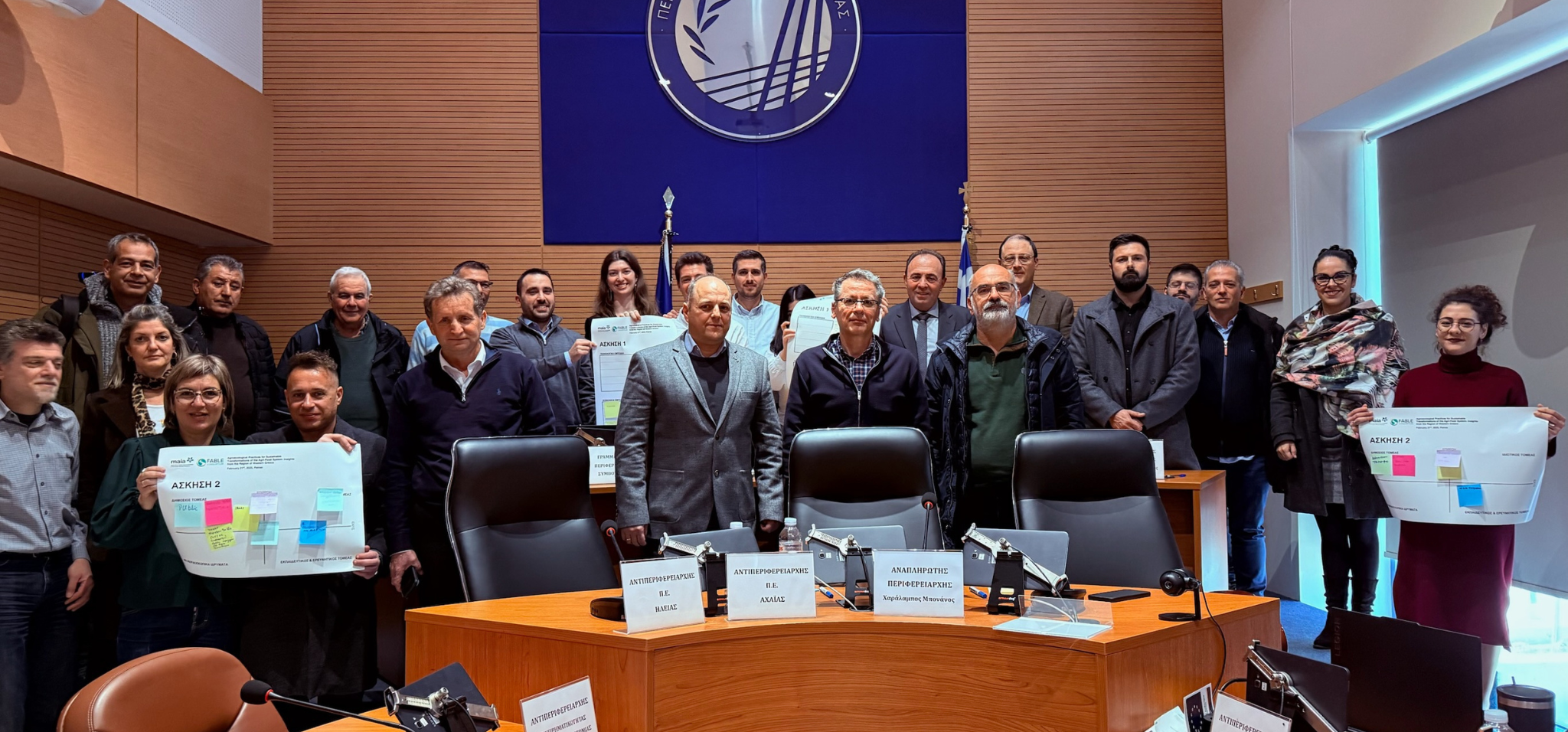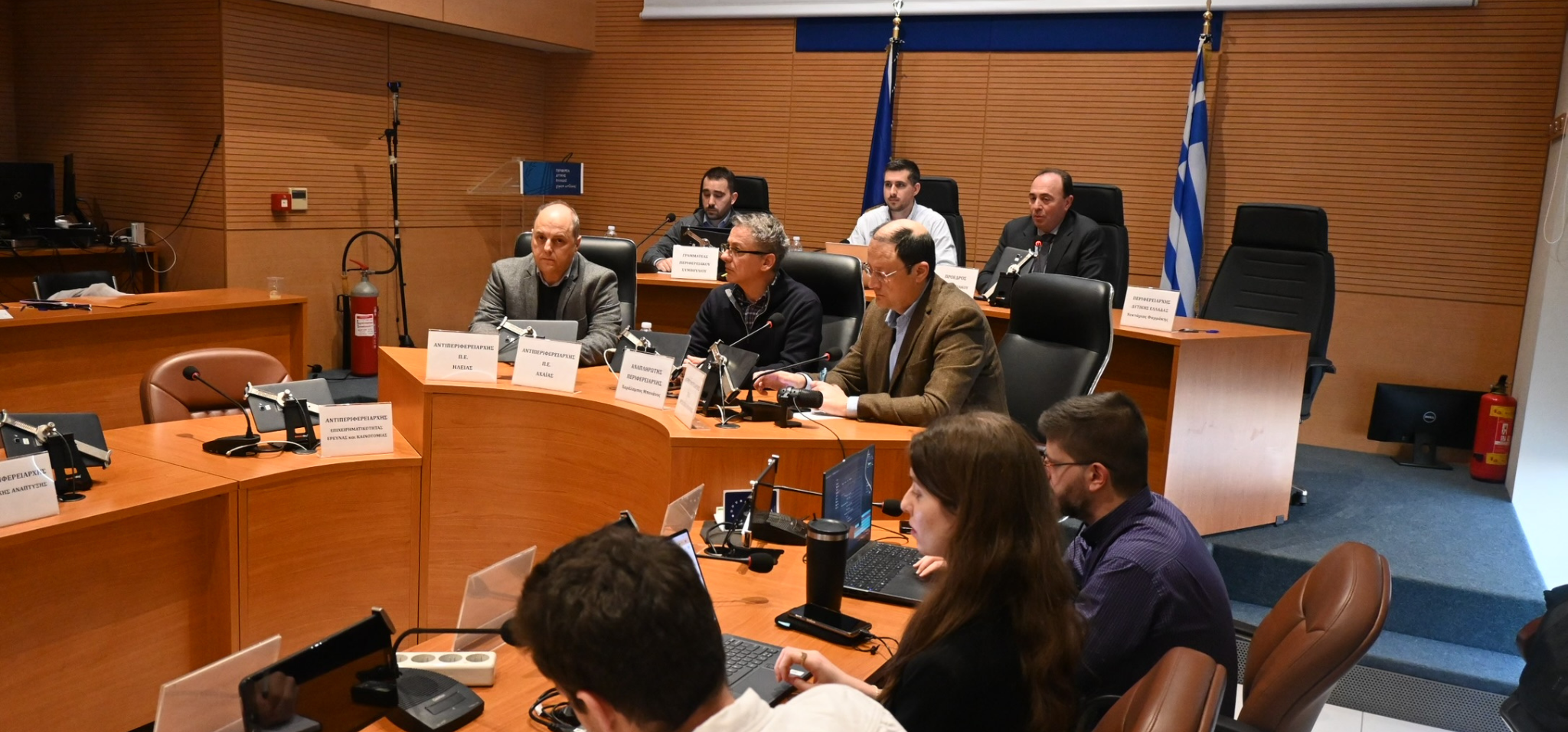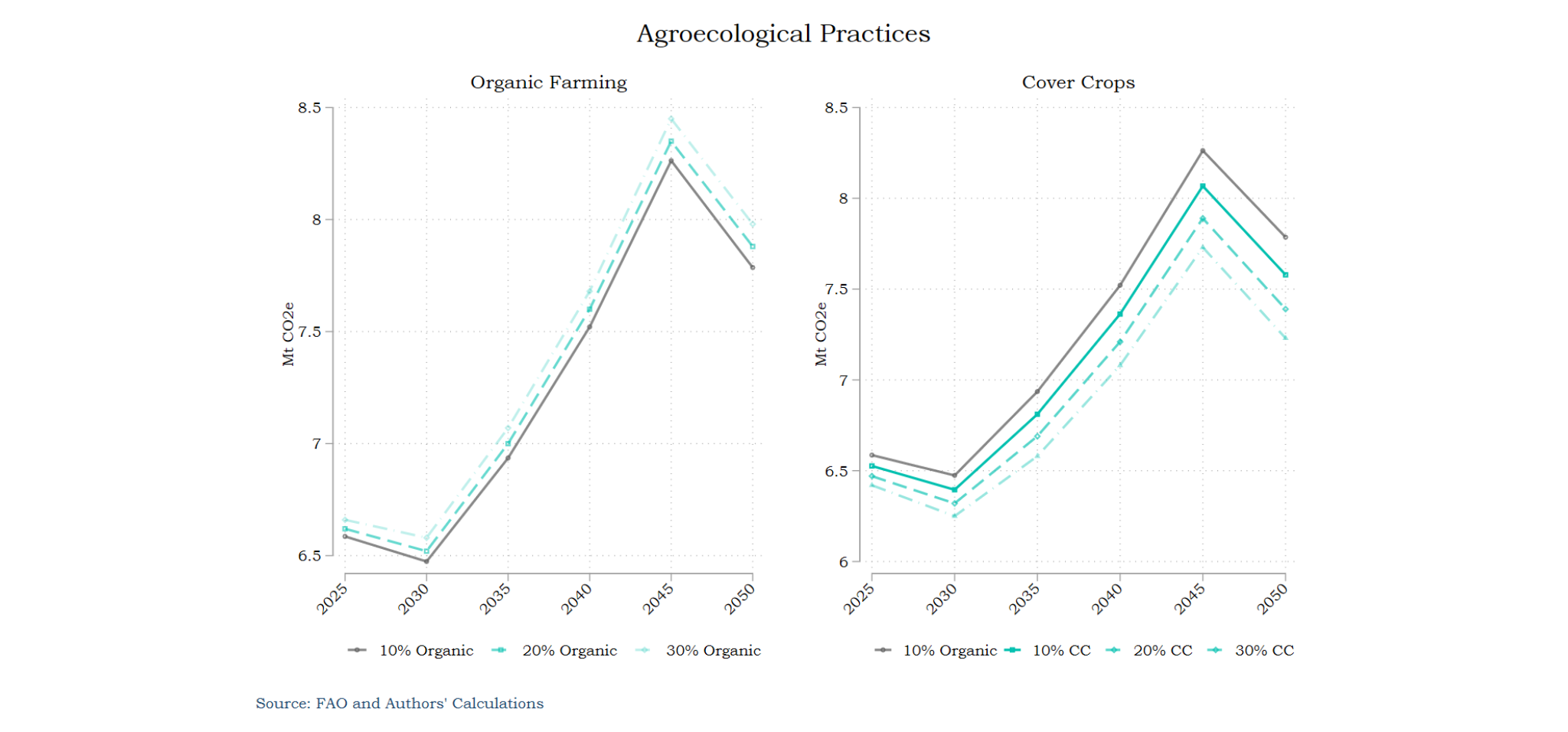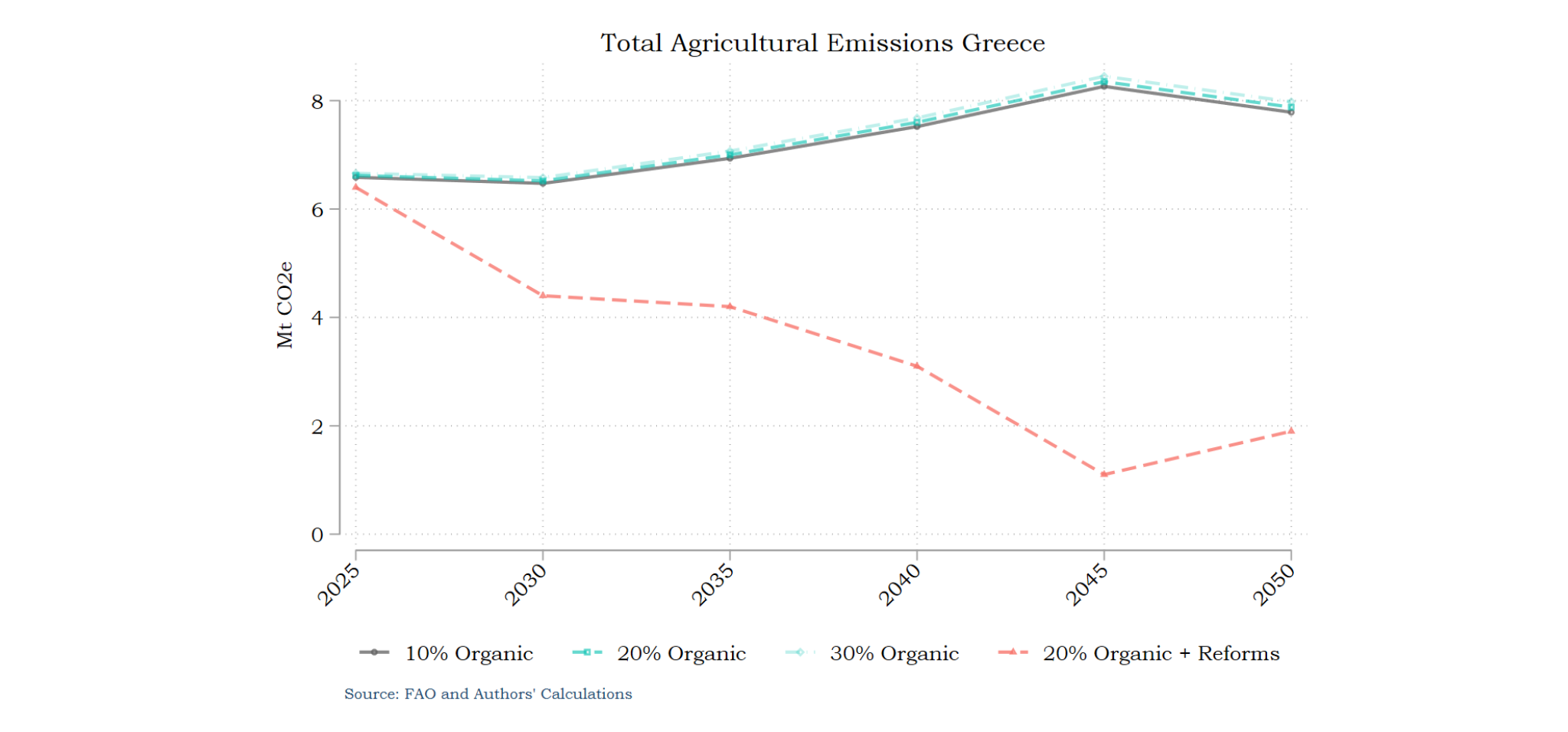
Authors: Prof. Phoebe Koundouri (AUEB), Dr. Kostas Dellis (AUEB), Dr. Fanis Zacharatos (ATHENA), and Hezal Dilan Sari (ATHENA).
Exploring sustainable food systems in Western Greece
On February 21, 2025, the FABLE Greece team held a workshop in Patras under the auspices of the MAIA HEU Project, to explore tools and roadmaps for achieving more sustainable food systems, with a focus on agroecological practices in the Region of Western Greece (RWG). The event addressed the challenges faced by Western Greece's agriculture, including climate change, soil deterioration, and economic constraints, and how agroecological practices, guided by FABLE Calculator insights, can enhance resilience, productivity, and livelihoods in the region.
Regional challenges and priorities
Deputy Regional Governor Mr. Andreas Filias underscored the multifaceted importance of the agricultural sector for the Region of Western Greece and defined the regional priorities in promoting the digital and sustainable transformation. He highlighted the strong research potential in the region and the support from various EU-funded projects, simultaneously stressing the need to connect research outputs to tangible actions in the field.
Dr. Vasiliki Lazarakou highlighted the importance of integrated innovative financial solutions to support sustainable transformation, especially in the agricultural sector. She underscored the role of the dedicated MAIA tools and services in connecting stakeholders across the quadruple helix on issues related to green agricultural transformations and in raising awareness through cutting-edge MAIA digital services.
Dr. Kostas Dellis and Chris Deranian (AE4RIA) presented insights from the FABLE Calculator, and highlighted its role as a powerful accounting tool for modeling sustainable pathways, including agri-food indicators. Among the results, they showed how Greek agriculture has been decarbonizing; however, not as fast as other sectors, leading to a growing share of GHG emissions since 2000.

Impact of agroecological practices on GHG emissions
The adoption of agroecological practices such as organic farming and cover crops has been moderate, far from the 25% target of the European Green Deal. Using 10% coverage in organic farming as our data-driven baseline, we used the FABLE Calculator to show that doubling this share would actually drive up GHG emissions, reflecting lower farm yields which drive up the use of land for agricultural production. Only N2O emissions show a 1-2% decrease by 2040 due to reduced use of synthetic fertilizers.
By contrast, increasing the use of cover crops to 20% of total agricultural land is associated with a 4% drop in GHG emissions by 2040, driven by:
i. Curtailed CH4 emissions (3-8% compared to the baseline scenario), reflecting enhanced soil aeration.
ii. Limited N2O emissions (2-5% compared to the baseline scenario) due to less use of nitrogen fertilizers; and
iii. Increased CO2 absorption emissions (4-10% compared to the baseline scenario) from LULUCF stemming from improved soil health.
Most importantly, in a scenario where current national sustainability pledges are fulfilled ('the National Commitments Pathway'), results show that integrating enhanced agroecological practices in Greece could bring emissions levels close to net zero by 2045 (Figure 2). The latter can act as an incentive for action on behalf of the farmers, conditional on bold reforms to enhance crop and livestock productivity and strengthen the regulatory framework.

Figure 1: Agroecological Practices and GHG Emissions in Greece.

Figure 2: GHG Emissions from Agriculture - Agroecological Practices and National Commitments.
Barriers and policy considerations to upscale agroecological practices
During the panel discussion that followed, Dr. Spyros Papaspyrou (Head of the Directorate of Agricultural Economy, Region of Western Greece) noted that eco-schemes have low adoption rates and need alignment with farmers' profit-maximizing incentives, possibly through increased productivity, innovation, and improved farm management.
Additionally, there is a severe lack of data in the field for agroecological practices. A crucial point is that there is not an explicit focal point for farmers and stakeholders in the agricultural sector to receive and share information on practices and challenges.
Dr. Konstantinos Milios (Head of the Directorate of Veterinary Services, Region of Western Greece) expressed concerns about the impact of sustainable practices on the EU livestock sector, particularly the potential reduction in livestock farming. This may face a backlash due to the adverse impact on agricultural income and the surge in the cost of food products, which are transmitted to the consumers. Green Credits and Carbon Offsets can provide a solution, aligning with the new EU strategy.
Dr. Pantelis Barouchas (Associate Professor, Department of Agriculture, University of Patras & Director of Soil Laboratory of RWG) provided vital information on current projects in the RWG which integrate digital solutions in agricultural practices.
During the in-person workshop that followed, moderated by Dr. Kostas Dellis and Ms. Hezal Dilan Sari, stakeholders identified key economic, technological, regulatory, and behavioral barriers to adopting and scaling agroecological practices in the region and across Greece.
The most prominent include:
• The disconnect between the agricultural sector and research outputs.
• The high initial costs of adopting cutting-edge technology.
• The low awareness among farmers and the complexity of implementing eco-schemes.
• The untapped potential of public-private partnerships in investing in sustainable and digital solutions for the agricultural sector, as well as the crucial role of the Ministry of Agricultural Development in streamlining procedures.
Overall, the participants underlined the need for consolidated results based on scientific evidence to build the economic and social case for sustainable transformation in the agricultural sector. Insights from the FABLE Calculator for Greece guided the discussion on embedding agroecological practices within a broader reform agenda aligned with the country’s National Commitments—ensuring significant contributions to agricultural decarbonization while maintaining regional and national competitiveness.
About the authors:
Prof. Phoebe Koundouri, Athens University of Economics and Business & Technical University of Denmark, President World Council of Environmental and Natural Resource Economists Associations; Chair SDSN Global Climate Hub; Director AE4RIA; Director Sustainable Development Unit ATHENA Research Center.
Dr Kostas Dellis, Athens University of Economics and Business;
Dr Fanis Zacharatos, Sustainable Development Unit ATHENA Research Center; Hellenic Open University; Region of Western Greece.
Hezal Dilan Sari, Sustainable Development Unit ATHENA Research Center.